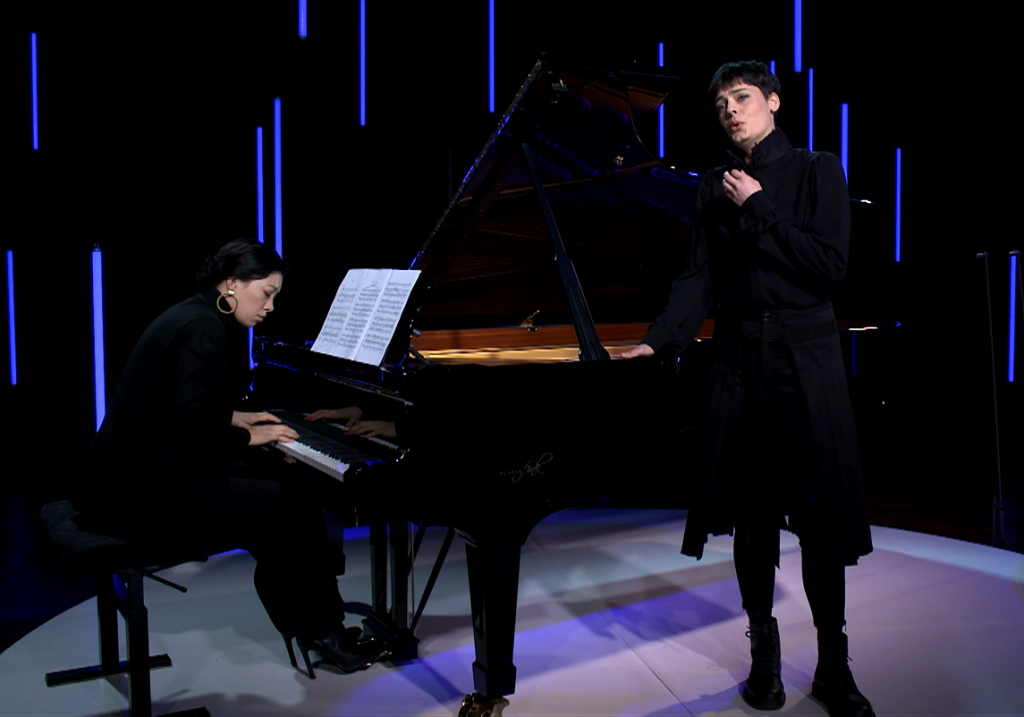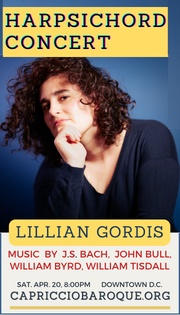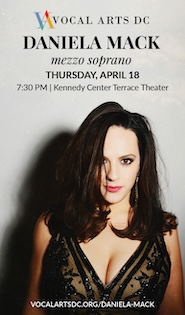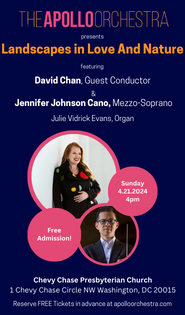Mezzo D’Angelo fêtes Vocal Arts anniversary in style

Vocal Arts DC is celebrating the 30th anniversary of its founding in 1990, even in this season upended by coronavirus. Thanks to some quick-thinking rearrangement, the city’s premiere presenter of vocal recitals has put on a series of five virtual recitals. The last one, featuring rising mezzo-soprano Emily D’Angelo, starts streaming today, free of charge to all listeners.
This beautiful 45-minute program was supported by the Gerald Perman Fund for Emerging Artists, which bears the name of the late founder of this concert series. It was recorded in warm sound and close-up video in Berlin’s Tanzsaal an der Panke.
The performance reveals a voice of cushioned lushness, intensified by a spiraling vibrato that is active but does not obtrude. Equally laudable is her choice of unusual repertoire, with songs composed by three men and six women, none of them too familiar and all of them worth hearing. It is little surprise that D’Angelo, in her mid-20s, has already won many prizes and performed acclaimed roles around the world.
D’Angelo plied her robust tone most naturally to late-romantic songs of long-breathed melodies and chromatic vagaries of harmony. She luxuriated in Alexander Zemlinsky’s “Heilige Nacht,” about a moonlit tryst. The same composer’s “Turmwächterlied,” provided more mysterious sounds and a triumphant finish. Sophia Muñoz, D’Angelo’s partner at the piano, wove an alluring story from the song’s long keyboard introduction.
Even better suited to the mezzo’s strengths were the first two songs of Schoenberg’s Vier Lieder. Composed in 1899, these pieces are similar in style to Zemlinsky, with vivid shifts in harmony that Muñoz negotiated with fluency. Set to poems by Richard Dehmel, these daring songs confronted both fairy-tale symbolism (“Erwartung”) and the quasi-blasphemous evocation of Jesus’ desire for Mary Magdalen (“Jesus bettelt”).
Also in an unexpected vein were two brief songs drawn from Copland’s Twelve Poems of Emily Dickinson. In “The World Feels Dusty,” enigmatic harmony undulated in Muñoz’s delicate hands, matching the stark simplicity of Dickinson’s literary style. The inexplicable effect of the instrument in “I’ve Heard an Organ Talk Sometimes” came through in the booming pedal bass of Muñoz’s left hand.
D’Angelo seemed to respond most personally to the songs composed by women. In Missy Mazzoli’s “You are the Dust,” the litany of words, drawn from the journals of boundary-breaking Swiss explorer Isabelle Eberhardt, elicited a rocking ostinato in the keyboard. Muñoz layered many other harmonies over these two repeated chords, as the strange, repetitive text built.
A similar intensity marked the long song “Penelope” by Cecilia Livingston, a composer D’Angelo knew during her years at the University of Toronto. Set to the composer’s own text, the words recall the desperate waiting of Penelope for the wandering Odysseus. A sense of self-doubting unease set in due to the piano’s discordant A-flat, which regularly disrupted the song’s progress like a disturbing chime.
Hearing Rebecca Clarke’s Yeats song “The Cloths of Heaven” twice in the same week was entirely unexpected. D’Angelo took this brief song a notch or two too fast, rendering it more perfunctory than elegiac. A second Clarke song, the bizarre “Seal Man,” featured an anxious recitative style and a horrified conclusion. The poem by John Masefield reverses the sexes of the undine myth, with a seal-man luring a woman to a watery death.
The dramatic potential of D’Angelo’s tone came through in the song that opened the recital, Florence Price’s “Night.” The nocturnal preoccupation of this program, featured also in Fanny Mendelssohn’s slow-paced, night-cast “Nachtwanderer,” led to a sameness of musical style that might have bogged down a less capable singer.
Only with Clara Schumann’s “Lorelei,” which concluded the recital, did the two musicians perform something fast and restless. Pulsating triplets from Muñoz at the keyboard supported D’Angelo’s exultant, searing high notes at this ultra-romantic song’s dramatic finish.
This concert can be streamed through April 18. vocalartsdc.org







